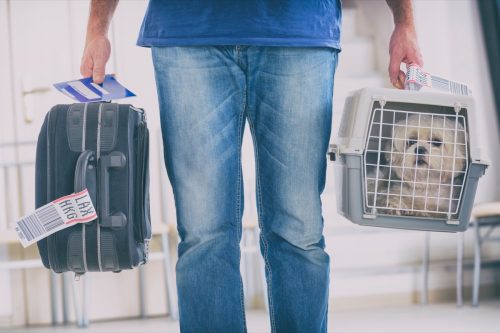The CDC Just Banned You From Bringing This on Flights
This new order affects people traveling to and from more than 100 countries.

Over the last two years, many people have been hesitant or unable to travel due to the risk of COVID exposure. Recently, however, air travel has been picking back up, in part due to safer conditions afforded by vaccinations and ongoing safety precautions on flights. But whether it's been a while since you've flown or you've taken a flight recently, you might want to brush up on what is and isn't allowed. The Centers for Disease Control and Prevention (CDC) just banned passengers from bringing one particular thing on planes, and the rule went into full effect on Oct. 14. Read on to find out what you can no longer take with you when you fly.
RELATED: Another Major Airline Is Cutting Flights for the Next 2 Months.
The CDC just banned passengers from taking dogs on certain flights to and from the U.S.

The CDC has banned dogs imported from countries at high risk for dog rabies. According to The New York Times, this ban not only applies to foreign dogs, but also to dogs traveling with American owners and trying to re-enter the U.S. after a trip abroad. The ban is so strict that "suspension also includes dogs that have visited a high-risk country in the past six months, even if they are arriving from a country not at high risk," the CDC warned.
Temporary suspension began July 14 and went into full effect on Oct. 14, as certain government employees on official orders were allowed to bring in dogs to any airport with a permit until this date. The CDC says it will "review this suspension periodically" but has not said whether or not it will be lifting the ban at some point in the future.
More than a hundred countries are affected by the ban.

The ban targets 113 countries within the Americas and Caribbean, Asia and the Middle East, Africa, and Eastern Europe that are classified by the CDC as at high risk for dog rabies. Popular travel destinations affected include Egypt, Brazil, Cuba, Russia, the Philippines, Thailand, and the United Arab Emirates.
Prior to this ban, dogs from these countries could be permitted if they had proper documentation for rabies vaccination, as the CDC estimates that 6 percent of all dogs imported into the U.S. arrive from countries at high risk for dog rabies. But in 2020, the agency reported a significant increase in the number of dogs that were denied entry into the U.S. from high-risk countries. There were "more than 450 instances of incomplete, inadequate, or fraudulent rabies vaccination certificates for dogs arriving from high-risk countries" between Jan. and Dec. 2020, per the CDC.
"Due to reduced flight schedules, dogs denied entry are facing longer wait times to be returned to their country of departure, leading to illness and even death in some cases," the CDC explained. And even if you're not traveling from one of the high-risk countries, the CDC still "strongly recommends a rabies vaccine certificate" when traveling into the U.S. with a dog.
RELATED: For more travel news delivered straight to your inbox, sign up for our daily newsletter.
Rabies can affect both humans and animals.

According to the CDC, dog rabies has been eliminated from the U.S. since 2007. But dogs that come from high-risk countries and are inadequately vaccinated are not protected against rabies and pose a "public health threat" to the country.
"Rabies is fatal in both humans and animals, and the importation of even one rabid dog could result in transmission to humans, pets, and wildlife," the CDC explained, noting that rabies is 99 percent fatal. Since 2009, 25 cases of human rabies have been reported in the U.S., resulting in 23 deaths.
The agency added, "This suspension will protect the health and safety of imported dogs by preventing importations of dogs inadequately vaccinated against rabies and will protect the public's health against the reintroduction of dog rabies."
The CDC is granting limited exceptions to this new ban.

This new ban is not without potential exceptions, however. From now until Jan. 7, dogs with CDC Dog Import Permits will be allowed to enter the U.S. at one of 18 major airports and then after, only at approved ports of entry which are currently just Atlanta International Airport, John F. Kennedy International Airport, and Los Angeles International Airport. Only certain individuals, like U.S. government employees with either a permanent change of station or temporary duty orders, citizens permanently relocating to the U.S., or owners of a service dog, can apply for this permit. And eligibility to apply doesn't guarantee you will be issued a permit, as the CDC warned that they will be "granted on an extremely limited case-by-case basis."
"Denied permit applications cannot be appealed," the CDC noted. In order to apply, you must submit an application for a CDC Dog Important Permit to the appropriate email address at least 30 business days, or six weeks, before you plan to travel to the U.S. "Permits will not be issued at ports of entry," the CDC warned.
RELATED: Never Wear This One Thing on a Plane, Flight Attendant Warns.





















